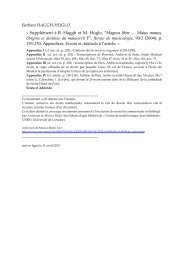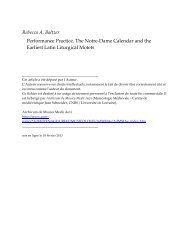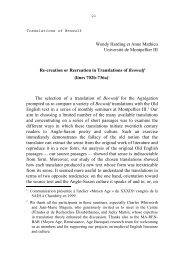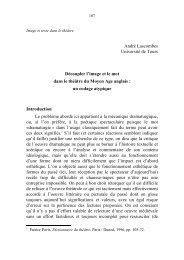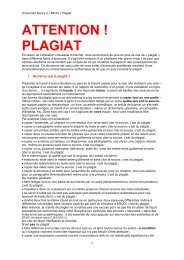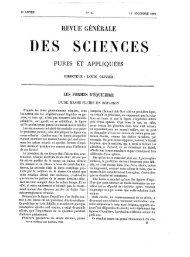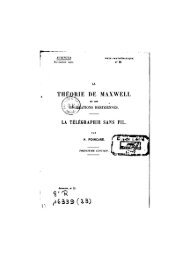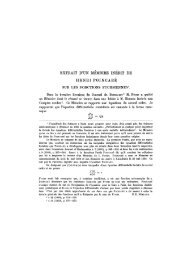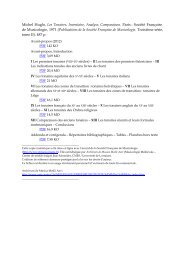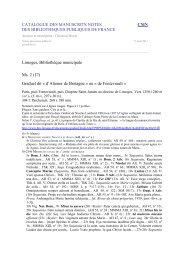Create successful ePaper yourself
Turn your PDF publications into a flip-book with our unique Google optimized e-Paper software.
Lytle werede<br />
113_(12U<br />
þara þe wið swa miclum mægne geræsde. (2085b-95) 21<br />
Bede, In Genesim III. on Gen. XIV.14:<br />
Miraculum quidem est diuinae potentiae permaximum, quod cum<br />
cohorte tam modica tantam hostium stragem fecerit Abram; sed altius<br />
sacramentum fidei [...] 22<br />
Again, it would appear that, on the basis of the presence in the<br />
Latin of cum cohorte tam modica, the poet, alive to the requirements<br />
of his alliterative scheme, has appropriated a stock phrase.<br />
To sum up at this point: despite the apparent appropriateness of<br />
the phrase lytle werede in supposedly objective descriptions of<br />
military engagements in the Anglo-Saxon Chronicle and similar texts,<br />
evidence about its use and function in other contexts suggests that it<br />
carried a weightier significance than the straightforwardly descriptive<br />
one. The fact that it is invoked in a wide variety of these contexts<br />
suggests that we are dealing with a set-phrase, one favoured because it<br />
carried extra-literal associations.<br />
There is, to my mind, one final piece of evidence which, if my<br />
interpretation be allowed, would confirm the thrust of my argument. I<br />
refer to the two-fold occurrence of the phrase mæte werede (unique in<br />
Old English) in The Dream of the Rood. Earlier, I laid stress on the<br />
fact that the combination of lytel and werod indicated that it was<br />
perceived as a fixed sense unit — so it appears in the prose and in<br />
Genesis A. But fixed phrase units in Old English poetry are subject to<br />
variation, one of the concepts which lie at the heart of what came to be<br />
known as the Oral-Formulaic Theory in the 1960s and 1970s. Mæte<br />
werede in The Dream of the Rood is such a variation (here poignant<br />
rather than ironic, as Michael Swanton has suggested) 23 of the<br />
21 . Alger N. Doane (ed.), Genesis A: A New Edition, Madison, Wisconsin, 1978.<br />
22 . Charles W. Jones (ed.), Bede: In Genesim, Turnhout: Brepols (Corpus<br />
Christianorum Series Latina, CXVIIIA), 1967, p. 187.<br />
23 . See Michael J. Swanton (ed.), The Dream of the Rood, Manchester: University<br />
Press, 1970, p. 125. All quotations are taken from this edition.



